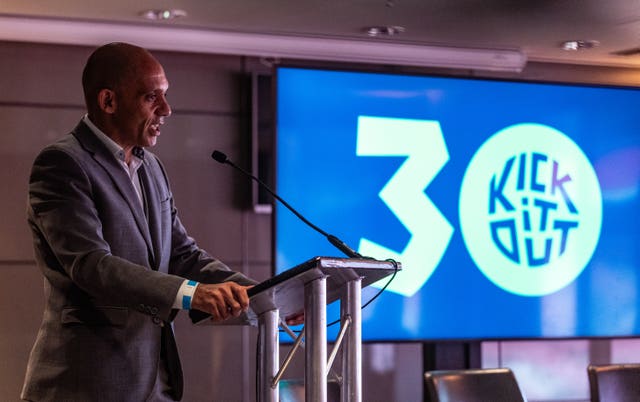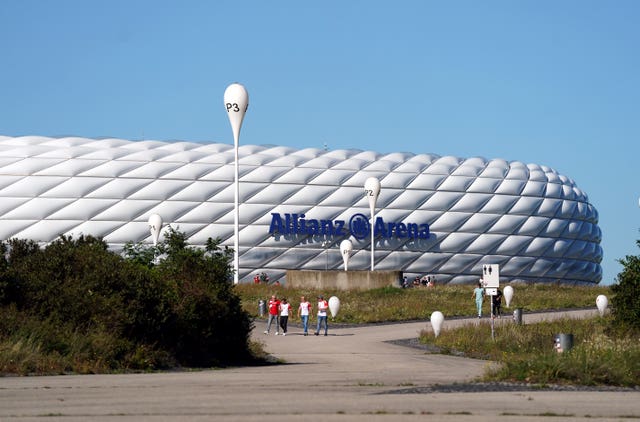The sanctions football imposes for racism and other forms of discrimination are “a joke”, according to Kick It Out’s chief executive.
Tony Burnett says the sport “doesn’t understand the concept of dignity at work” and insisted there would be “outrage” if incidents which occurred at football matches were repeated in other settings.
FIFA is set to outline plans for a global stand on racism at its Congress in Bangkok next week, with its president Gianni Infantino accepting a more joined-up approach is required.

Burnett criticised FIFA and UEFA over what he described as the “preventable and predictable” abuse suffered by England players Raheem Sterling and Jude Bellingham during a World Cup qualifier in Hungary in 2021, because a stadium ban imposed by UEFA had not been carried over.
He welcomed the idea of a united stance, but said the devil would be in the detail on the new FIFA proposal, and urged FIFA to start by looking at the sanctions it hands out for incidents of discrimination.
“What I would like to see from FIFA is more punitive measures, the stuff that’s in their power to effect – ground closures, bans from competitions, player bans etc,” he said.
“I think it’s been a joke when you look at some of the sanctions: partial stadium closures for a game, closing a stand for a game.
“There should be a comprehensive approach, but it has to be strong enough to effect change.
“On a really basic level, football doesn’t even understand the concept of dignity at work. Football and (players’) employers have a responsibility to protect them as employees.
“Can you imagine watching a play where the actors are going on to the stage knowing there’s a really high likelihood that they’re going to be abused, discriminated against and potentially have things thrown at them? There would be outrage.
“Equity (the performing arts trade union) would not let them go on that stage and the theatre would probably be closed down.
“But we keep having this conversation in football because employees in football, it’s just assumed that they’re open to, and will have to accept, abuse.”
Burnett also expressed strong reservations over UEFA’s capability to adequately tackle incidents at the Euros this summer, amid concerns about how the rise of far-right politics across the continent could impact on player and supporter safety.
“I’m worried about the winds that are blowing through societies right across Europe. I’m worried that at the Euros we’ve got not just countries like Hungary, but you look at countries like Spain, France, Portugal, Germany even, where the far right is having a far bigger influence.
“It worries me what we’re going to see at the Euros, the environment that is going to be created for our players and supporters is of concern.
“I just don’t think we’re creating a culture where people are more included. I think, actually, we’re doing the opposite at the minute.

Burnett said he was “not confident at all” in UEFA’s ability to confront the issue within and around Euro 2024 venues, adding: “I haven’t got a clue what UEFA’s principles (on tackling discrimination) are.
“The whole notion of the three-step rule and various other things, it’s been proven to be a complete and utter failure. It’s completely ad-hoc. I don’t have any clue how UEFA or the officials are going to respond.
“If you look at what has happened historically with countries like Hungary for example, the response was completely inadequate. So I hope UEFA is taking the right advice to do better.”
UEFA has set out comprehensive plans for tackling racism at this summer’s tournament, including training stewards on how to respond to and report incidents, the provision of ‘safe spaces’ if wanted by victims of discriminatory abuse.
Reported incidents will go to an external law firm and then be reported to UEFA if it occurred at a location where UEFA is responsible. External observers in the stadiums will also provide reports on any discriminatory incidents observed.
UEFA insists instances of racism are taken very seriously, including the potential application of the three-step procedure which can ultimately result in matches being abandoned.
Article 14 of UEFA regulations state that partial stadium closures are the minimum sanction that can be applied, while the minimum suspension for a player found guilty of discriminatory behaviour is 10 matches.
FIFA has also been contacted for comment.
For exclusive stories and all the detailed EFL news you need, subscribe to The Football League Paper website, digital edition, or newspaper from as little as 14p a day.
















